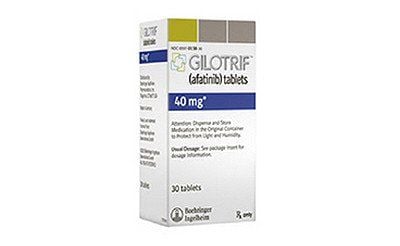This is an automatically translated article.
Afanix 40 contains the active ingredient Afatinib, which is considered a targeted therapy in the treatment of EGFR mutation-positive non-small cell lung cancer. So what is the mechanism of Afanix 40 and what should be noted when using it?
1. What is Afanix 40?
Afanix contains the active ingredient Afatinib, which is considered a targeted therapy in the treatment of non-small cell lung cancer. Afanix 40 is classified as a Tyrosine Kinase inhibitor and inhibitor of Epidermal Growth Factor Receptor (EGFR or Epidermal Growth Factor Receptor).
Afanix 40 is used mainly in the initial treatment of cases of non-small cell lung cancer (NSCLC) with mutations in the EGFR gene (epidermal growth factor) such as exon 19 loss or exon 21 replacement. (L858R) detected through tests. Afanix 40 has been approved by the FDA for the treatment of patients with advanced, metastatic squamous non-small cell lung cancer following platinum-based chemotherapy.
The mechanism of action of the active ingredient Afatinib is similar to Lapatinib and Neratinib, which is a protein kinase inhibitor, besides the effect of inhibiting mutations on the epidermal growth factor receptor 2 (Her2) and the receptor of epidermal growth factor 2 (Her2). epidermal growth factor (EGFR).
Afatinib in Afanix 40 not only has targeted activity against EGFR mutations similar to first-generation tyrosine-kinase inhibitors such as Erlotinib or Gefitinib, but it can also work against some mutations (although less common) resistance to these drugs.
However, Afanix 40 is not as effective against the T790M mutation as third generation drugs (such as osimertinib). Because of its ability to resist Her2 mutations, Afanix 40 is being considered for use in the treatment of Her2-positive breast cancer and cancers associated with EGFR and Her2 mutations.
Phase III data demonstrated a superior improvement in progression-free survival with afatinib compared with erlotinib in patients with advanced squamous cell carcinoma (SCC) with lung metastases.
Afanix drug product manufactured by Beacon Pharmaceuticals Limited (Bangladesh) with a strength of 40mg. Afanix 40 is in the form of tablets for oral use.
2. Uses of Afanix 40
Initial treatment for patients with metastatic non-small cell lung cancer (NSCLC) with mutations in the epidermal growth factor gene (EGFR) exon 19 deletion or exon 21 substitution; The safety and effectiveness of Afanix 40 have not been established in cancer patients with other EGFR mutations.
3. Contraindications of Afanix 40
Afanix is not recommended for use in the following cases:
Patients with atopic allergies to any of the ingredients in Afanix 40; Pregnant and lactating women; Children under 18.
5. Instructions for using Afanix 40
The recommended dose of Afanix 40 is to take only 1 tablet per day.
Instructions for using Afanix 40:
Patients need to take Afanix 40 exactly as prescribed by the doctor; The time of taking the medicine should remain the same every day, 24 hours apart; Take Afanix 40 on an empty stomach, at least 1 hour before meals or 2 hours after meals; When taking, it is necessary to swallow the Afanix 40 tablet whole with a glass of water, do not chew or crush the tablet; If you forget to take a dose, you should not make up for it when it is less than 12 hours before the next dose is due.
6. Some issues to be careful when using Afanix
Skin toxicity: Patients should use Afanix 40 with caution because of the risk of some serious skin reactions such as Stevens-Johnson syndrome (SJS) or toxic epidermal necrolysis (TEN); Diarrhea : Afanix 40 may increase the risk of developing severe diarrhea. Therefore, patients should be cautious as diarrhea can lead to dehydration and/or kidney failure; Pulmonary toxicity: Afanix 40 may increase the risk of negative lung effects such as interstitial lung disease (ILD) with infiltrates, pneumonia, acute respiratory distress syndrome, allergic alveolitis. .. Therefore, the patient should pay attention and notify the doctor when there are abnormal respiratory symptoms such as shortness of breath, cough, fever,... Liver disease: Afanix 40 should be used with caution in people with disease. liver problems due to a higher risk of side effects. Patients should be closely monitored through liver function tests while taking Afanix 40, and promptly contact a doctor when there are unusual symptoms; Ocular toxicity: Using Afanix 40 may increase the risk of keratitis, characterized by acute inflammation, lacrimation, blurred vision, photosensitivity, eye pain...; Dizziness: Use of Afanix 40 may cause dizziness in some patients. This warns users not to drive or operate machinery if they become dizzy during treatment with this medicine.
7. Side effects of the drug Afanix
Doctors prescribe Afanix 40 for patients when the benefit of treatment is higher than the risk of side effects. Many people who use Afanix 40 experience no serious side effects.
Some side effects of Afatinib:
Diarrhea, which can be very serious and unresponsive to antidiarrheal drugs; Nausea, vomiting; Decreased appetite; dry, sometimes swollen, red, or painful skin; Dry and itchy eyes; Fever; Diarrhea, painful urination; Weight loss; Manifestations of dehydration
8. Drug interactions of Afanix 40
Drug interactions can change how Afanix 40 works or increase the risk of serious side effects.
Patients need to list all the products they are using, including prescription drugs, over-the-counter medicines and herbal products... and then share it with their doctor and pharmacist before starting treatment. with the drug Afanix 40 .
Please dial HOTLINE for more information or register for an appointment HERE. Download MyVinmec app to make appointments faster and to manage your bookings easily.













